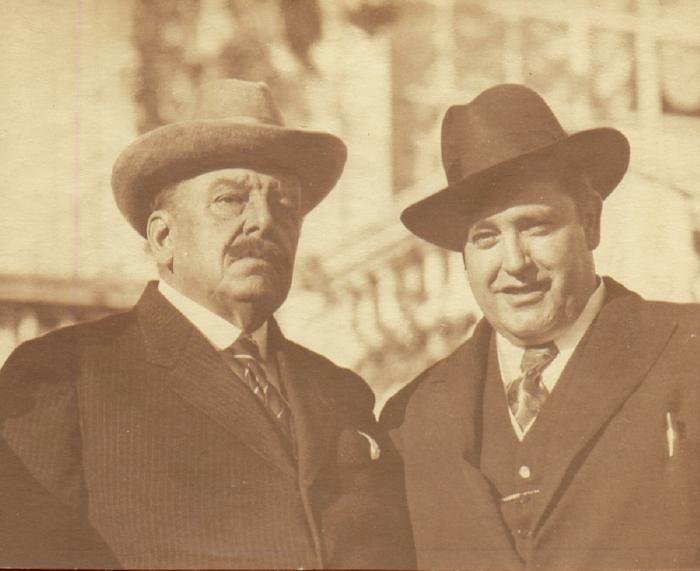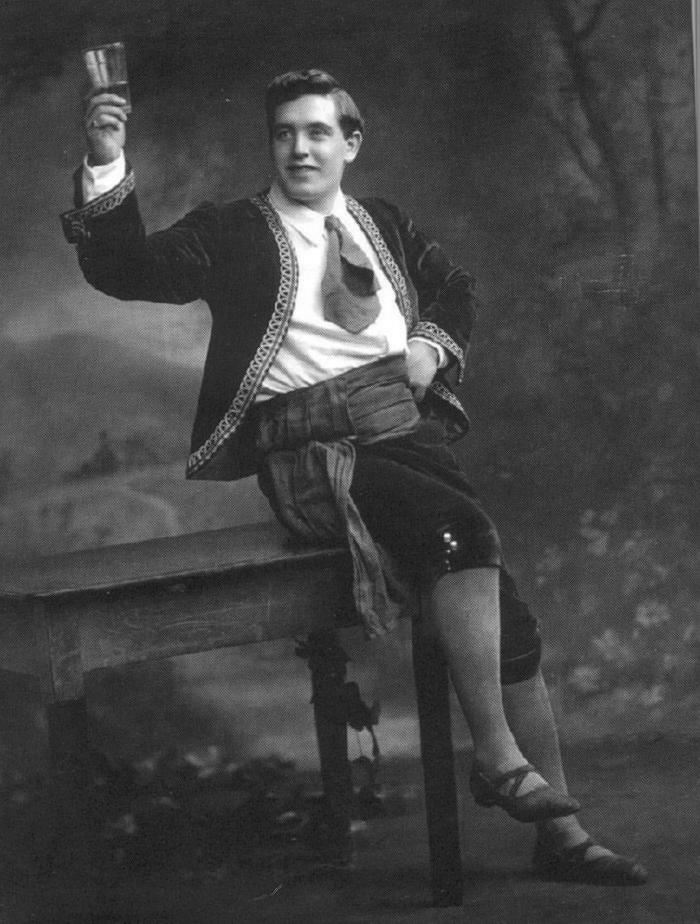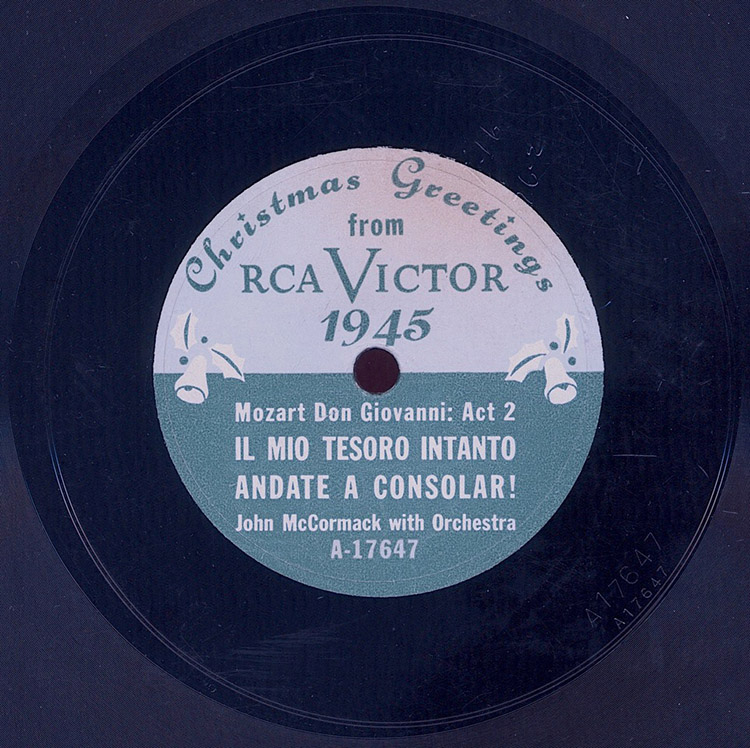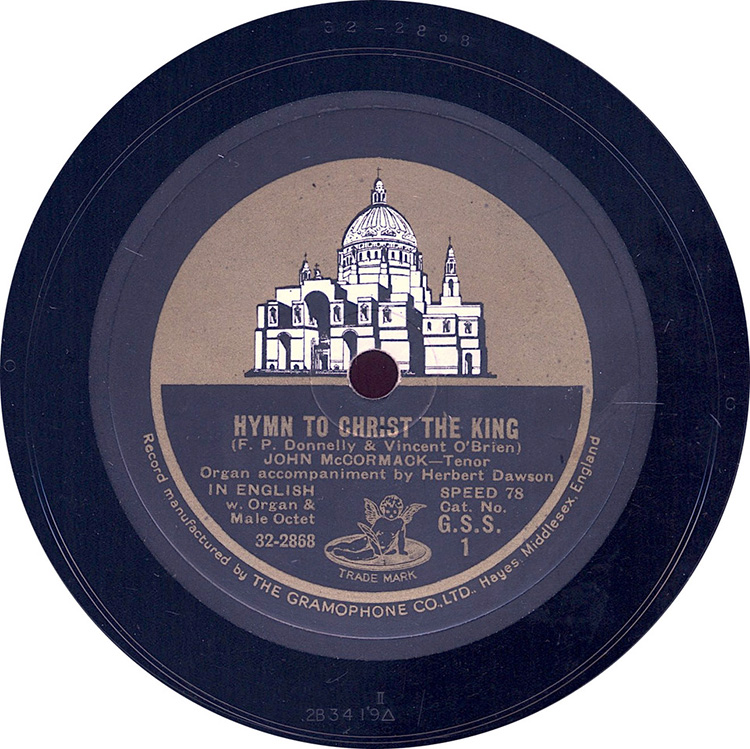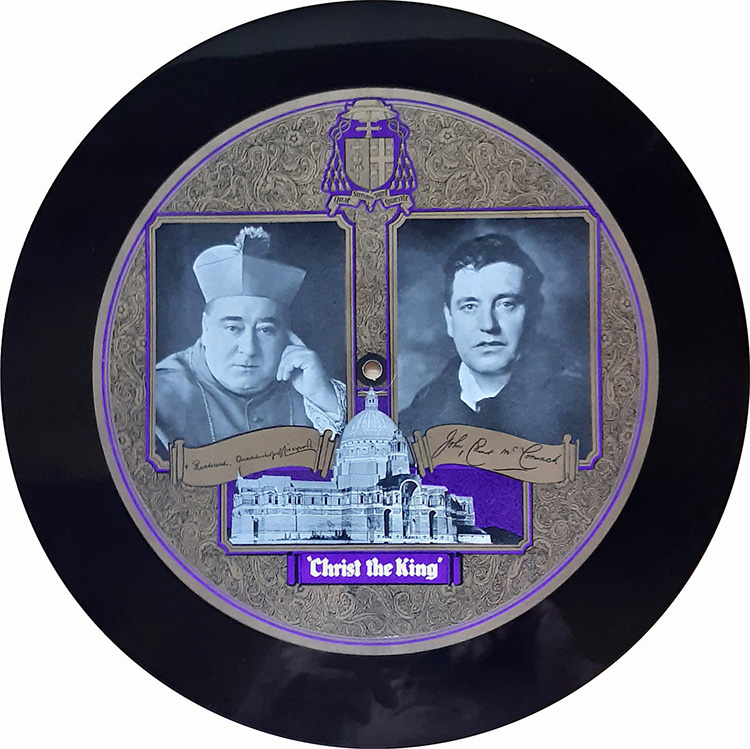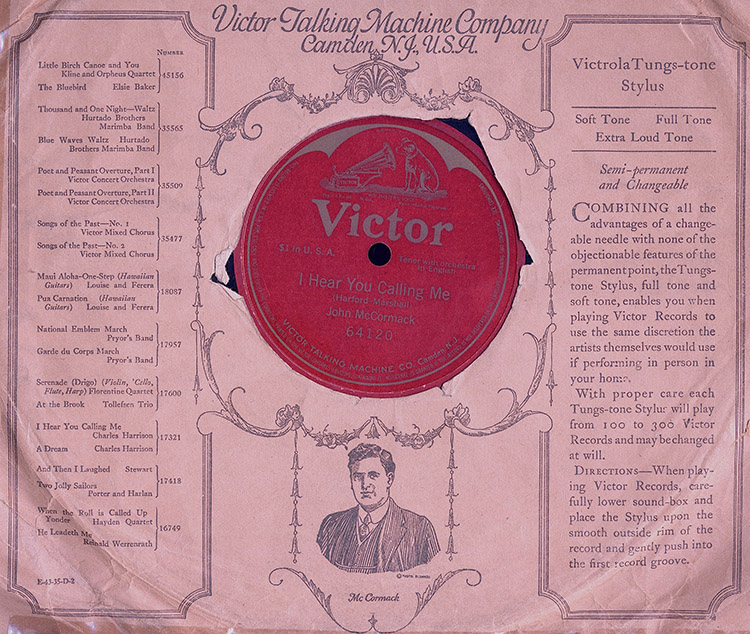John McCormack
John McCormack with Jean de Reszke
In RA format
Still popular almost 30 years after the recording had been made.
Single-sided charity disc for the benefit of the building fund of Liverpool Cathedral
...and the reverse of this beautiful disc, showing the Archbishop of Liverpool, and McCormack as Rodolfo
(his favourite photo)
In RA format
Many thanks to Anton Bieber for the label-and-sleeve scan, and for the Don Giovanni and Christ the
king recordings and relative label scans.
I would like to thank Derek Walsh for the picture with de Reszke.
I would like to thank Thomas Silverbörg for the recordings (I hear you calling me, Bing Crosby show).
There is a disagreement about John McCormack the opera singer. Many consider him a great operatic tenor.
How does this match up with facts?
McCormack made his operatic debut in Savona (January 1906) in L'amico Fritz at the
Teatro Chiabrera under the name of Giovanni Foli. He sang also La cabrera (by Gabriel Dupont) and stayed in
Savona for two months. McCormack sang probably in other small Italian towns.
He failed to secure an engagement at La Scala, when he cracked a high C during an
audition, according to Scott's book The record of singing, volume 2.
McCormack went back to England and made his debut at Covent Garden in 1907 and
stayed there until 1914. His Covent Garden seasons comprised the following roles:
1907, autumn: Cavalleria rusticana 4 times at best (role shared with the great Spanish
tenor Viñas); Don Giovanni 2 times; Rigoletto 2 times at best (role shared with Carpi).
Total number of performances 8 at best.
1908, April–July: Cavalleria rusticana 3 times at best (role shared with the Czech
tenor Mařak); Lucia di Lammermoor 5 times at best (role shared with Bonci);
Rigoletto 4 times at best (role shared with Bonci); La traviata 6 times at best
(role shared with Mařak). Total number of performances 18 at best.
1909, April–July: Don Giovanni 2 times; Lucia di Lammermoor 2 times at best (role
shared with the great Anselmi); Rigoletto 5 times at best (role shared with Anselmi);
La sonnambula 4 times; La traviata 6 times. Total number of performances 19 at best.
1910, April–July: La bohème 6 times; Lakmé 5 times; La
sonnambula 2 times; La traviata 7 times. Total number of performances 20.
1911, April–July: La bohème 4 times at best (role shared with the great heroic tenor Bassi);
Lakmé 3 times; Rigoletto 6 times; La sonnambula 1 time; La traviata 5
times at best (role shared with Armanini). Total number of performances 19 at best.
1912, April–July: Il barbiere di Siviglia 2 times; La bohème 7 times; Madama Butterfly 5
times at best (role shared with Gaudenzi); Rigoletto 4 times; La traviata 3 times.
Total number of performances 21 at best.
1913, April–July: La bohème 4 times; Don Giovanni 3 times; Faust 1 time;
Madama Butterfly 5 times at best (role shared with Martinelli); Rigoletto 1 time; La
traviata 2 times. Total number of performances 16 at best.
1914, April–July: Don Giovanni 3 times; Madama Butterfly 5 times; Mefistofele 3 times;
Rigoletto 2 times; Tosca 4 times. Total number of performances 17.
McCormack's total career at Covent Garden is at best 138 performances.
Unfortunately the book by Rosenthal on Covent Garden neither gives dates of
performances or a breakdown for singers sharing a role.
In 1909, McCormack sang at the San Carlo in Napoli in La traviata and Rigoletto for a
total of 12 times at best since he shared Alfredo with Massa and Fazzini.
McCormack made his debut at the Manhattan Opera during the
1909/10 season. He sang La traviata, Lucia di Lammermoor, La fille du régiment,
La bohème,
Tosca (act 2 only), Rigoletto, Cavalleria rusticana and Lakmé
for a total of 20 performances.
With the
Hammerstein's Company, McCormack sang also in:
Philadelphia (Opera House, 1909/10) in Lucia di Lammermoor, La fille
du régiment, La traviata, Rigoletto, La bohème, Lakmé for a total of 12 performances.
Pittsburgh (1909) in Lucia di Lammermoor and La traviata for a total of 2 performances.
Cincinnati (1910) La traviata 1 performance
Washington (1910) Lucia di Lammermoor, La traviata, La fille du régiment
for a total of 3 performances.
Boston (1910) Lucia di Lammermoor, La fille du régiment, La
traviata for a total of 3 performances.
McCormack sang at the Chicago Opera Company as follows:
1910/11 season: Cavalleria rusticana, La bohème, Rigoletto, La traviata, Tosca (total 10 performances).
1915/16 season: La bohème, Don Giovanni (total 2 performances)).
1918/19 season: La bohème (total 1 performance).
With the company, McCormack appeared on tour in Baltimore in 1911 (Natona by Victor Herbert,
Les contes d'Hoffmann), New York (Natona), Philadelphia
(Natona, Rigoletto, Cavalleria rusticana,
Les contes d'Hoffmann), St. Paul (Les contes d'Hoffmann)
for a total of 15 performances.
McCormack appeared also with the Boston Opera Company during the 1910/11 season in Cavalleria rusticana and La bohème for
a total of 3 performances.
McCormack sang also in Parma during September 1910 in
one performance of La fille du régiment.
McCormack's Met career was short in number of performances. He made his debut
in 1910, and sang last in 1918, but he appeared only 10 times in opera
(La bohème, Madame Butterfly, Tosca, La traviata) and 3 times in concert.
McCormack toured Australia in 1911 singing in La traviata, Faust, La bohème, Madama Butterfly, Tosca,
Rigoletto for a total of at least 7 performances.
In 1914, McCormack appeared in Paris with the Boston Opera Company for
a total of 3 performances, singing in La bohème and Il barbiere di Siviglia.
Finally, McCormack ended his operatic career in Monte Carlo
during the 1921 and 1923 seasons singing in Tosca, Die
Zauberflöte, Il barbiere di Siviglia, Madama Butterfly, Martha and Sorochinskaja jarmarka/La foire de Sorotchintzi for a total of 18
performances.
If we add all the performances McCormack sang in, we come to a total of approximately 260. Since we do not know what he did when
he was in Italy for a short time at the beginning of his career, we probably can safely assume that McCormack sang a maximum of 300
operatic performances. This number is very small compared to the thousands of concerts he sang or to the over
2000 operatic performances both Caruso and Gigli took part in.
Scott states in his book The record of singing (volume 2) that:
His voice was a naturally high lyric tenor of a sweet and characteristic quality extending to top D.
Had he elected on a career in ballads and ballad opera (...), he would have produced the upper tones, in the fashion
we hear in the recordings of O'Mara, Coates, Beddoe ... But the examples of Caruso and the need to contrive a forceful effect
in climaxes in say, the music of Cavaradossi and Turiddu (...) encouraged him to open the top notes and shout.
As a result, the voice ascended with ease only to A; he could produce a B flat and a B natural but the quality was not
consistent with the rest of the voice, while the top C and above was distinctly a gamble. The failure with the high notes was one
of the factors (...) in bringing his operatic career to an ultimate conclusion in 1923 when he was not yet forty.
Until his death, he only appeared in concerts and films.
McCormack is a perfect example of a tenor destroying his voice by singing unsuitable
repertory. However McCormack could sing very convincingly ballads, where he excelled.
He could interpret even the worst musical pieces effectively and with all his heart and conviction à la Tauber.
Repertory
L'amico Fritz, La cabrera, Cavalleria rusticana,
Don Giovanni, Rigoletto, Lucia di Lammermoor, La traviata,
La sonnambula, La bohème, Lakmé, Il barbiere di Siviglia,
Madama Butterfly, Faust, Mefistofele, La fille du régiment,
Tosca, Natona, Les contes d'Hoffmann, Die Zauberflöte, Martha,
Sorochinskaja jarmarka.
|
Reference: Lily McCormack: "I hear you calling me",
The Bruce Publishing Co., Milwaukee, 1949
Reference: L. A. G. Strong: "John McCormack",
Peter Neville Ltd., London, 1949
Reference: L. F. Mac Dermott Roe: "The John McCormack discography",
The Oakwood Press, Lancashire, 1971
Reference: Gordon T. Ledbetter: "The great Irish tenor",
Charles Scribner's Sons, New York, 1977
|
